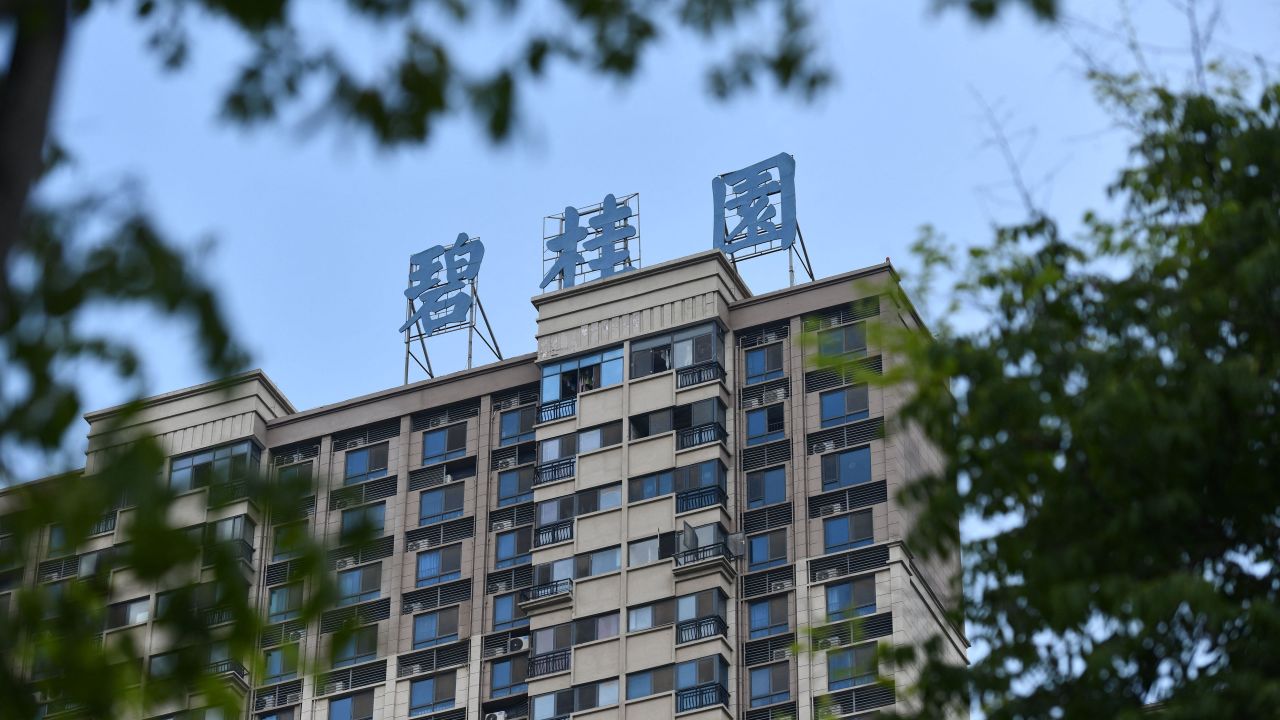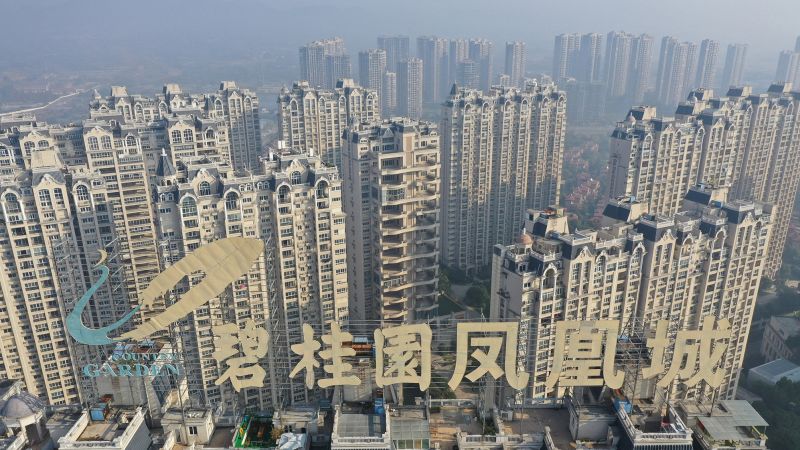Editor’s Note: Sign up for CNN’s Meanwhile in China newsletter which explores what you need to know about the country’s rise and how it impacts the world.
Chinese property giant Country Garden has twice narrowly avoided defaulting on its debt in a matter of days. But it’s not home free.
The developer, China’s largest in terms of home sales, continues to keep investors around the world on edge as it faces more upcoming payment deadlines on billions of dollars it has borrowed.
The company has about 27 billion yuan ($3.7 billion) in bonds either due to bondholders or subject to demands for early payment through the end of 2024 alone, according to a Wednesday estimate from Moody’s.
While a deadline to repay one bond has just been extended, it continues to stare into an abyss of nearly $200 billion in liabilities — and faces mounting pressure to pay up.
That will be tough, as slowing home demand in China has hammered its cash flow and wiped out its profit.
Here’s what to know about Country Garden, and the future it faces.
Country Garden has long been one of China’s biggest real estate developers, specializing in residential property.
Listed in Hong Kong and based in Foshan, Guangdong the company has developed 3,000 projects across the country, provided housing for more than 5 million people and converted more than 1,400 rural towns into cities.
The group also develops commercial spaces, such as hotels, parking lots and retail stores, though it has branched out dramatically in other areas, such as robotics and agricultural services.
It is also responsible for masses of jobs in China, employing some 300,000 people, according to its most recent annual report.
The developer is also part of the Global 500, meaning it’s one of the world’s biggest businesses by revenue. It booked nearly 430.4 billion yuan (about $59 billion) in sales last year, though just a tiny fraction of that — 2.6 billion yuan ($357 million) — was taken home in net profit.
That was down significantly from revenue of about 523 billion yuan ($71.6 billion) and net profit of approximately 41 billion yuan ($5.6 billion) in 2021.
In recent weeks, Country Garden has become emblematic of China’s spiraling property crisis, which is hampering efforts by the government to reignite economic growth.
Its troubles are reminiscent of those of Evergrande, a once mighty Chinese developer that defaulted in 2021. Evergrande filed for bankruptcy in the United States last month, after posting losses of $81 billion in the last two years.
While confidence in China’s real estate sector has been shaky since the collapse of Evergrande, Country Garden reignited fears last month when its liquidity crisis burst into public view.
That was when reports emerged that the company had missed interest payments on two US dollar bonds, casting attention on its overall debt problems.
Investors have since been bracing for a potential default by Country Garden, which has openly admitted this could happen soon.
Such an event could send shockwaves across the world’s second biggest economy, as real estate accounts for an estimated 25% to 30% of China’s GDP.
The issue is seen as one of the biggest tests for the leadership in Beijing this year as officials work to stem a broader economic slowdown that has also battered consumer confidence, exports and retail spending.

Last week, Country Garden posted a record loss of 51.5 billion yuan ($7 billion) for the first half of the year, and acknowledged that it had missed some interest payments in August.
On Tuesday, state media reported that it had made late payments on the two US dollar bonds shortly before the end of a 30-day grace period, avoiding an imminent debt default.
Country Garden shares in Hong Kong have plunged 55% so far this year as investors dumped the stock. It was removed as a constituent of the city’s flagship Hang Seng Index last month.
To try to contain the crisis, the developer has recently set up a special task force and leaned on its wealthy owners.
Since the company’s listing in 2007, Chairwoman Yang Huiyan and her family have pumped in approximately 38.6 billion Hong Kong dollars ($4.9 billion), in the form of new loans and share and bond purchases, the firm said in an August filing. Yang is one of China’s richest women, though her own fortune has plummeted recently.
But Yang said in a separate statement that China’s property sector had been hit by “an unprecedentedly difficult business environment” last year, with “frequent outbreaks of property developers’ credit crises, sales in the doldrums, and lack of confidence among businesses.”
This year hasn’t been much better, with a slump in both property sales and investment in the first six months of 2023, according to the group.
For now, Country Garden has avoided the worst.
It has paid off $22.5 million in overdue interest on the two US dollar bonds, according to state media, and also reportedly won approval this week from local creditors to delay repayments on a maturing yuan-denominated bond, allowing it to buy more time to repay the outstanding principal of $540 million until 2026.
It must, however, continue to pay interest on the bond as initially scheduled. Country Garden did not respond to requests for comment from CNN.
But the company still has a slew of new deadlines ahead, with around 13 billion yuan ($1.8 billion) of onshore bonds and approximately 14 billion yuan ($1.9 billion) of offshore bonds either due to bondholders or subject to demands for early payment through the end of next year, according to a Moody’s estimate shared with CNN.
The credit rating agency has downgraded Country Garden to a rating of “Ca,” which means the company’s obligations “are likely in, or very near default.”
What’s worse, the outlook for its core business is darkening. On Friday, Fitch Ratings cut its forecast for new home sales in China, saying it expects a drop of 10% to 15% this year, “steeper than our previous estimate of a 0% to 5% drop.”
The agency cited “reemerging pressure on home prices” as a factor.
And although Chinese policymakers have worked to support the industry, Country Garden’s crisis may create a vicious cycle, as it could “exacerbate weakness in homebuyers’ sentiment,” according to Fitch.
Read the full article here










